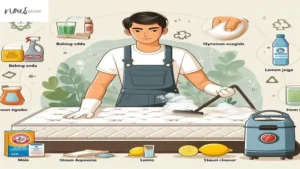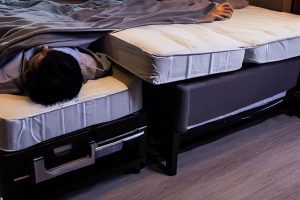It’s true that a good night’s sleep is essential for living a healthy life. But did you know that a mattress protector can be just as important? Is A Mattress Protector Necessary?
Not only does it preserve the cleanliness and health of your sleep environment, but it can also help to extend the life of your mattress.
In this Nousdecor article, we’ll explain why a mattress protector is necessary and what it takes to choose the right one.
Key Takeaways
- A mattress protector is necessary for preserving the cleanliness and health of the sleep environment.
- It extends the life of the mattress and protects against stains, spills, allergens, and dust mites.
- Choosing the right mattress protector based on the type of mattress and desired benefits is important.
- Proper care and maintenance of the mattress protector are essential for a clean and healthy sleep environment.
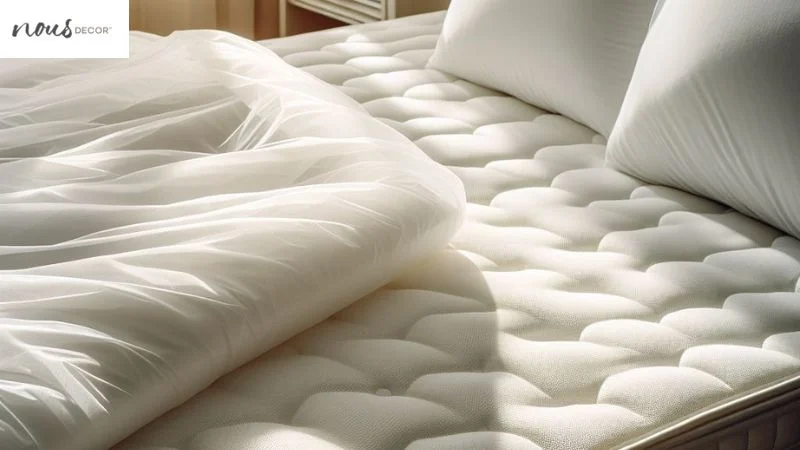
Benefits of a Mattress Protector
You need a mattress protector to reap the benefits of protecting your mattress, keeping your sleep environment clean and healthy, and improving sleep comfort.
The importance of mattress protectors includes shielding against stains and spills, and guards against allergens and dust mites. It can extend the lifespan of your mattress by preventing dirt, moisture, and allergens from staining and degrading it. Additionally, a mattress protector can protect against stains that may void the mattress warranty.
It can be a waterproof mattress pad, memory foam mattress, fitted sheet, mattress encasement, bed bugs, Casper mattress, bed frame, bed sheet, or waterproof mattress protector. With so many options, you have the opportunity to find the perfect match for your mattress.
As a result, you can enjoy all the advantages of a mattress protector and have a better night’s sleep.
Types of Mattress Protectors
Choosing the right mattress protector can help ensure that your sleep environment is clean and healthy, while also extending the life of your mattress.
Mattress protectors come in a variety of styles, including mattress pads, foam toppers, and water-resistant protectors.
Mattress pads offer an extra layer of protection for mattresses, while foam toppers provide a comfortable cushioning that helps reduce allergic reactions. Memory foam is often used as a top layer for mattresses, as it helps absorb dead skin cells, providing a more comfortable sleep.
Water-resistant protectors are also available, which are great for protecting sleep products from moisture and spills.
With so many options to choose from, finding the perfect mattress protector for your bed can ensure a comfortable and healthy sleep environment.
How to Choose the Right Mattress Protector
Finding the right sleep product for your bed is essential for a comfortable and healthy sleep environment. Choosing a mattress protector is just as important as selecting a mattress, as it provides many benefits, such as shielding against bedbugs, dirt, moisture, and allergens.
It also helps in keeping mattresses aligned and avoiding indentations, maintaining mattress warranties, offering tips for sheet retention on airbeds, and providing waterproof and latex options.
When deciding on the ideal product, it’s essential to consider the type of mattress you own and how often wash mattress protector. With the right mattress protector, you can ensure your mattress is protected, so you can have a good night’s sleep.
Mattress Protector Care and Maintenance
Once you have your protector, proper care and maintenance are essential for keeping your sleep environment clean and healthy.
If camping, using a camping warmth for air beds can be good for preventing air mattress deflation.
When using a new mattress, a good mattress protector is a good choice. A Purple mattress could benefit from a good mattress protector as well, as it is made from latex foam and natural latex.
A box spring can also benefit from a protector, as it will help maintain the sleep quality of the mattress.
Taking proper care of your mattress protector will extend the life of your mattress and keep your sleep environment comfortable and healthy. Thus, making a mattress protector an important part of a good night’s sleep.
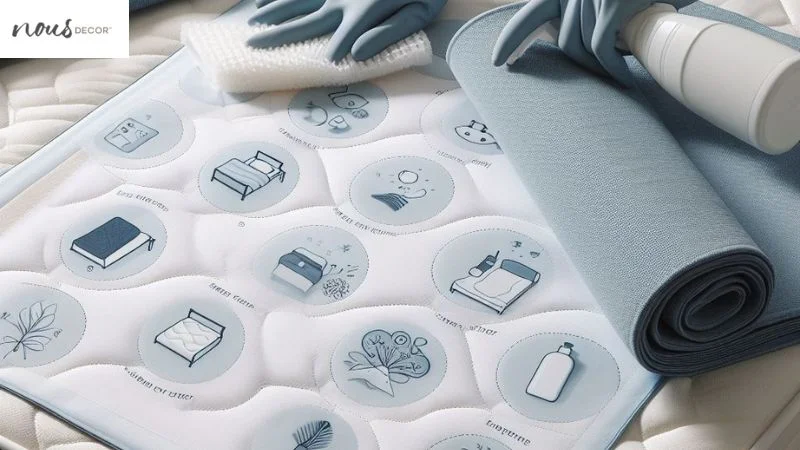
Pros and Cons of Mattress Protectors
Having a mattress protector can bring many benefits, but there are also some drawbacks to consider:
- Tumble drying can be harmful for some mattress protectors, especially if they’re not made from a heat-resistant material.
- Some mattress protectors don’t fit latex mattresses well and may not stay in place.
- They can make your mattress feel a bit warmer than usual.
- They can be costly depending on the type and quality.
- They may not be a good idea if you’re dealing with bed bugs.
It’s important to weigh the pros and cons before deciding if a mattress protector is the optimal mattress for you.
Moving forward, let’s explore the common myths surrounding mattress protectors.
Common Myths Surrounding Mattress Protectors
Despite popular belief, there are some misconceptions about mattress protectors that should be addressed.
Many people think that mattress protectors are only for those with messy habits, but in reality, they are a necessary addition for anyone who wants to keep their mattress in good condition.
Mattress protectors are not just about protecting against spillage; they are also about safeguarding against dust mites and allergens.
Additionally, mattress protectors do not make your mattress hot or uncomfortable. In fact, they can actually improve sleep comfort and keep your sleep environment clean and healthy.
Even if you are a clean person, a mattress protector can still help extend the lifespan of your mattress and protect your warranty.
With its numerous benefits, a mattress protector is not just a luxury but an essential item.
Health Benefits of Mattress Protectors
Investing in a mattress protector can provide numerous health benefits. It shields against dirt, moisture, and allergens that can stain and degrade the mattress. It also prevents dust mites and allergens, guards against stains and spills, enhances sleep comfort, extends the lifespan of the mattress, and voids the mattress warranty.
Protecting your mattress with a mattress protector is an important step towards a healthy sleep environment. Plus, the cost of a mattress protector is relatively low compared to the cost of a new mattress.
Cost of Mattress Protectors
You’ll find that the cost of a mattress protector is relatively low compared to buying a new mattress.
Mattress protectors can range from under $20 to over $100, depending on the material, size, and features. Generally, a basic mattress protector is more affordable and can be used to protect against liquids, dust, and other allergens.
A more expensive option may offer extra padding and added comfort. But regardless of the type you choose, a mattress protector is a great way to protect your investment and improve the longevity of your mattress. Plus, it can provide additional peace of mind that you’re making a good purchase.
With the cost of a mattress protector being relatively low, it’s an affordable way to make sure you’re getting a good night’s sleep.
Transitioning now into alternatives to mattress protectors.
Alternatives to Mattress Protectors
While it may not be essential, there are alternatives to protecting your mattress that can still help you get a good night’s sleep.
- Ensure that your mattress is vacuumed regularly to remove dust and dirt.
- Utilize a mattress encasement to guard against allergens, dust mites, and moisture.
- Place a mattress topper on top of your mattress to add an extra layer of comfort and cushioning.
- Invest in a mattress pad for additional comfort and protection from spills.
- Utilize a mattress protector to provide a waterproof barrier and to protect against stains.
These alternatives can help extend the life of your mattress while providing a comfortable night’s sleep. However, in order to get the most out of your mattress, it is important to consider whether or not a mattress protector is necessary.
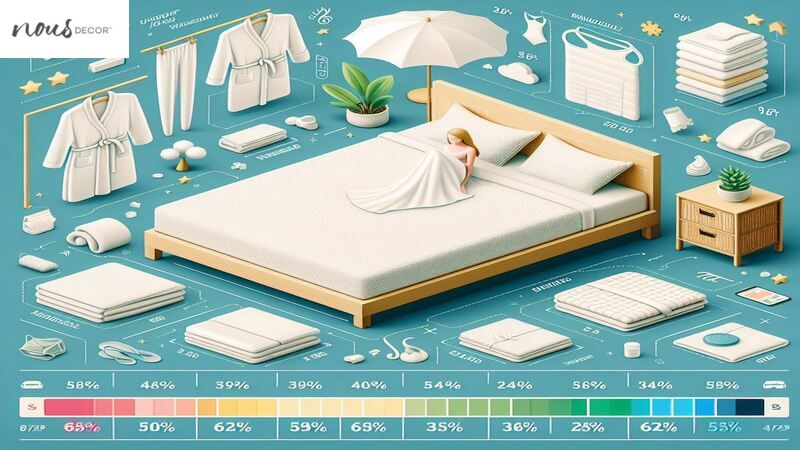
So Is A Mattress Protector Necessary?
Deciding whether a mattress cover is right for you is an important part of maintaining a comfortable and healthy sleep environment just like choosing between firm and plush mattress.
A mattress protector provides a range of benefits, from preventing dirt and moisture from damaging the mattress to guarding against allergens and dust mites.
Additionally, it can help extend the lifespan of your mattress, as well as protect it from stains that could void its warranty. All of this makes a mattress protector not just a luxury, but a necessity.
With all of the advantages it offers, a mattress protector is an essential part of keeping your sleep environment clean and healthy. Investing in a mattress protector is the best way to ensure your mattress will last longer, and that you’ll enjoy a more comfortable sleep.
Frequently Asked Questions
Conclusion
After considering all the benefits of a mattress protector and the various types available, it’s clear that a mattress protector is necessary.
Not only will it help you get a good night’s sleep, but it will also extend the lifespan of your mattress by up to twice as long.
With an average lifespan of 7-10 years, investing in a mattress protector is well worth it – especially when you consider that the average person spends about a third of their life in bed!
So why not make sure that time is spent in the best conditions possible?

